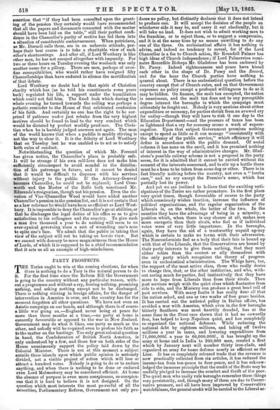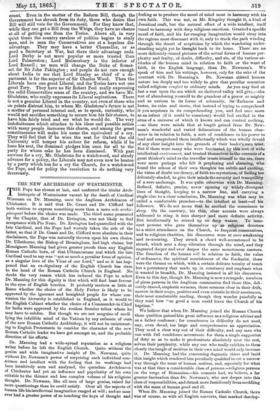PARTY PROSPECTS.
THE Tories ought to win at the coming elections, for when there is nothing to do a Tory is the natural person to do it. For the first time since the Reform Bill the Government is going to the country without any particular reason, with- out a programme and without a cry, fearing nothing, promising nothing, and asking nothing except not to be discharged. There is nothing stirring in foreign affairs, for the danger of intervention in America is over, and the country has for the moment forgotten all other questions. We have not even an Asiatic campaign on our hands and although there is of course a little war going on,—England never being at peace for more than three months at a time,—no party at home is earnestly favourable or opposed to the war in New Zealand. Government may do what it likes, one party as much as the other, and nobody will be required even to profess his faith as to the matter on the hustings. The only great colonial question in band, the Confederation of British North America, is only understood by a few, and those few on both sides of the House unanimously support the policy laid down by the Colonial Minister. There is not at this moment a subject outside these islands upon which public opinion is seriously divided, not a visible project of action which will lose or attract a hundred votes. Nobody is going to do or to endure anything, and when there is nothing to be done or endured even Lord Malmesbury may be considered efficient. At home the absence of purpose is even more conspicuous, so conspicu- ous that it is hard to believe it is not designed. On the question which most interests the most powerful of all the minorities, Parliamentary Reform, Government not only pro-
duces no policy, but distinctly declares that it does not intend to produce one. It will accept the decision of the people on whichever side it may be, and carry it out obediently, but it will take no lead. It does not wish to admit working men to the franchise, or to reject them, or to suggest a compromise, and it is at the same time by no means unwilling to do any one of the three. On ecclesiastical affairs it has nothing to advise, and indeed no tendency to reveal, for if the Lord Chancellor is a foe to Church action, Sir Roundell Palmer has high ideas of Church independence; if Lord Palmerston nomi- nates Recordite Bishops Mr. Gladstone has been endorsed by Dr. Pusey. Indeed righteousness and peace have kissed each other in the shape of Dr. Pusey and the Record, and for the hour the Church parties have nothing to quarrel about. There is no ecclesiastical question before the country except that of Church-rates, and on that Government expresses no policy except a profound willingness to do as it may be bidden. On finance, the malt tax excepted, the nation is unanimous, and the malt tax does not to any perceptible degree interest the boroughs in which the campaign must ultimately be fought out. Nobody is very anxious about either expenditure or economy, for parties shrink from an avowed cry for outlay—though they will have to risk it one day in the Education Department—and the pressure of taxes has been so lightened that a cry for economy seems a work of supere- rogation. Upon that subject Government promises nothing except to spend as little as it can manage "consistently with the efficiency of the public service," which efficiency it will define in accordance with the public demand. Of social reforms it has none on the anvil, and it has promised nothing of interest in the way of administrative changes. Mr. Glad- stone's possible railway scheme is not a proposal in the party sense, for it is admitted that it cannot be carried without the consent of the interests concerned, and to stir up a battle there must be a bone to be taken from some dog or other. There is in fact literally nothing before the country, not even a " lorcha case," and no cry except the Premier's name, which has partially lost its power. And yet we are inclined to believe that the exulting anti- cipations of the Tories are rather premature. In the first place very quiet times, though favourable of course to the party which consciously wishes inaction, increase the influence of political organizations, and the regular organization of the Liberals is, on the whole, the better of the two. In the counties they have the advantage of being in a minority, a position which, when there is any chance at all, makes men more energetic than their rivals, who feel as if individual votes were of very little importance. In the boroughs, again, they have the aid of a trustworthy unpaid agency which is certain to make no terms with their adversaries. The Nonconformists feel as a body that their fate is bound up with that of the Liberals, that the Conservatives are bound by their party interests to give them nothing, that they must either retire from the contest or ally themselves with the only party which recognizes the theory of progress even in ecclesiastical administration. The Whigs have, too, the support of the most active class, those who really desire to change this, that, or the other institution, and who, with- out caring much for parties, feel instinctively that they have more to hope from Liberals than from their rivals. Then past services weigh with the quiet class which fluctuates from side to aide, and the Ministry can produce a great bead roll of past services. With many faults it has really done all that the nation asked, and one or two works of free grace besides. It has carried out the national policy in Italian affairs, has avoided a war with America, which even in.the few boroughs bitterly Southern was most -heartily dreaded, has at the same time in the Trent case shown that it had no cowardly fear, has helped to keep Napoleon quiet, and has completely re-organized the national defences. While reducing the national debt by eighteen millions, and taking off twelve millions a year in taxes, and lowering expenditure from 71,000,000/. a year to 66,000,000/., it has brought up the army at home and in India to 200,000 men, created a fleet which by January next will number thirty iron-clads, and organized an army for home defence nearly as efficient as the Line. It has so completely released trade that the revenue is now practically collected from six articles, it has reduced the income-tax from ten-pence to four-pence, and it has acknow- ledged the immense principle that the credit of the State may be usefully pledged to increase the comfort and thrift of the poor.. The quiet men who really rule boroughs remember these things very persistently, and, though many of them are due to Conser- vative pressure, and all have been improved by Conservative watchfulness, the general credit will be carried to the Liberal ac-
eount. Even in the matter of the Reform Bill, though the Government has shrunk from its duty, those who desire that Bill will still vote for the Government. For they know that, while they can get a Bill from the Whigs, they have no chance at all of getting one, from the Tories. Above all, in very quiet times the country careless of politics begins to study men, and in men the Conservatives are at a hopeless dis- advantage. They may have a better Chancellor, or as good a Secretary at War, but there their advantage ends. Lord Derby is not more popular or more trusted than Lord Palmerston ; Lord Malmesbury is the inferior of Lord Russell ; no man will change the Duke of Somer- set for Sir Iohn Pakington ; and people do not care enough about India to see that Lord Stanley as chief of a de- partment is far the superior of Sir Charles Wood. Then the Liberals have one great Liberal, and the Tories have not one great Tory. They have no Sir Robert Peel really expressing the solid Conservative sense of the country, and we have Mr. Gladstone, who really expresses its Liberal aspirations. There is not a genuine Liberal in the country, not even of those who on points distrust him, to whom Mr. Gladstone's future is not a matter of personal interest and, so to speak, curiosity, who would not sacrifice something to secure him his fair chance, to have him fairly tried and see what he would do. The very indefiniteness which attaches to his ideas and possible action with many people increases this charm, and among the great constituencies will make his name the equivalent of a cry. They will feel that if he wins the seat for Oxford the old University will temper his ardour for reform, while if he loses his seat, the dismissal pledges him once for all to the party for whose sake he has been dismissed. With past services for a cry, Mr. Gladstone for a watchword, and steady advance for a policy, the Liberals may not even now be beaten by a party which has for a cry the Church, for a watchword the Pope, and for policy the resolution to do nothing very decorously.































 Previous page
Previous page